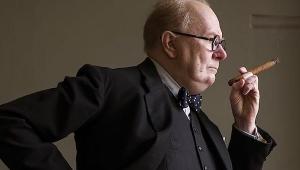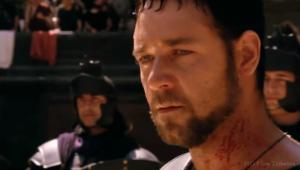Viewpoint: Bits and Pieces
 So many little things have flown over the transom this month (does anyone even have a transom anymore?) that a lapse into blogging mode seemed the best way to clear them out.
So many little things have flown over the transom this month (does anyone even have a transom anymore?) that a lapse into blogging mode seemed the best way to clear them out.
In the trailer for The Fantastic Four, the Human Torch is having his temperature taken when the nurse exclaims, "You're Hot." To which he politely responds, "Thank you. So are you." I know this because I saw the trailer in the theater. Somehow, I suspect it was the best line in the movie, which I haven't seen (unless you count The Incredibles).
But everyone is hot this week. With temperatures baking the sidewalks in the San Fernando Valley, air conditioners are working overtime. We haven't had any rolling blackouts—that part of the California dream seems to have ended with the departure of Enron and governor what-was-his-name?
When I stepped into my home theater today to crank up the system, I was puzzled by intermittent but evenly spaced beeps coming from the equipment rack. First I thought it was a cricket with an unusually precise pitch and an uncanny sense of timing. But then I noticed the voltage indicator on the Monster HTPS Home Theater Reference Power Source serving most of my system. It read 99 volts; the beep was a low-voltage warning. Much of the equipment was turned on, as it usually is, though the only serious current hog was Denon's AVR-5805, a monster 10-channel, 90-pound AV receiver I'm currently reviewing.
Because I had removed Monster's companion piece to the HTPS, the AVS 2000 Automatic Voltage Stabilizer, from the system while other power conditioners await their turn on the rack, what I got from the wall is what the equipment sees. And 99 volts meant that no serious evaluations would be conducted that afternoon.
Later in the evening, the voltage crept up to 104 with the Denon receiver and air conditioner on, 108 with the Denon on and the air conditioner off, and 110 with both off. That's still a few volts low, but tolerable and probably not much different than you'll get in most big cities this season with or without a cat on your hot tin roof.
Oddly, I had lunch just last week with folks from a company called Active Thermal Management. They manufacture a variety of cooling fans for AV gear, arguing that excessive heat (usually generated by the equipment itself, not mother nature) can greatly shorten the life of your system. Sounds like a convincing story to me, and while it's impossible to prove any enhancement to equipment life in a few weeks of testing, we still plan to take a look at a few of their models in an upcoming report.
Decades ago, movie theaters used to invite you in to keep cool in the summer. Air-conditioned theaters were probably responsible for summer becoming a big movie season. A few films have been hotter this summer than The Fantastic Four's Human Torch—notably, of course, the final chapter in the Star Wars saga—but the film industry is still crying the blues. Box-office grosses are well short of last year's pace.
But DVD sales are definitely up. Folks are figuring out that a night out at the movies for the whole family is a lot more expensive than bringing home a DVD or two and some EZ-Pop. Combine that with the shrinking window between the theatrical release and the DVD launch, together with the growth in the sales of big, widescreen televisions and home theater sound systems, and you have a least one answer to the sagging box office.
I also suspect that if the entertainment conglomerates looked at the combined grosses for all the major media they have a hand in—movies, DVDs, video games, and even the real sick man of the business, music on CD—their revenues would show a nice upward tick. (TV doesn't count; no one expects television watching to increase in the summer.) But it's so much more fun to cry the blues. Helps keep those mega-star salaries in check, too. "Sorry, Brad, we can only afford to pay you $10 mil for Troy II: Revenge of the Horse."
Among the more creative ideas Hollywood has come up with to stop the bleeding is give-away DVDs positioned prominently in major retailers. I picked up the latest of these at Best Buy just a week or so ago (there may even be some left if you hurry). It's a behind-the-scenes look at the upcoming movie Stealth. The DVD was good enough that I would have paid for it—well, maybe just a few bucks.
But the trailers were the real attraction on this disc. The audio and video on all of them is outstanding. In addition to Stealth, you get The Omega Code (more of a tease, really, since the film doesn't open until next May), Zathura (looks a lot like Jumanji Part II, which makes sense, since it's made by the same people), Rent, The Cave, xXx—The State of the Union, and Steamboy.
On another topic, reader Bill Moore wrote from Wichita, Kansas, that in my recent review of the 1953 movie The War of the Worlds, I neglected to mention producer George Pal, "...the quintessential fantasy-film producer/director of his time. The Time Machine and The Wonderful World of the Brother's Grimm were two of his best films, along with the H.G. Wells classic. I feel that [Pal's film] is better than the current version, just because the effects had to be produced by cleverness, resourcefulness, and ingenuity rather than on a computer. George Pal was indeed a movie-making genius and will be remembered as such, along with other such creative and imaginative effects people as Ray Harryhausen. All the current effects guys cut their teeth on seeing the work of these early pioneers."
Right you are, Bill, and I'll take 50 lashes with a wet tentacle for forgetting to mention Pal in the review.
And my reaction to the new Spielberg version? I liked it, but didn't love it, and I'll have more to say when the DVD arrives on Ultimate AV's doorstep this fall.
Finally, in this month's Ultimate AV Newsletter (you do get it, don't you? If not, you can sign up here), I discussed surrounds in my "Editor's Hot Tip." In listing the pros and cons of dipoles, the newsletter read:
Be careful of: Discrete music with instruments and voices in the surround channels. In this case, mount them where the listening seats are outside the null. Timbre matching with the front speakers can be dicey at best, though less critical on films than music.
I was too clever by half in my attempt at parallel construction here, and the meaning fell apart in the edit. I should have set the ideas apart with bullet points. What I meant was:
Be careful of:
·Discrete music with instruments and voices in the surround channels.
·Listening from seats outside the null.
·Timbre matching with the front speakers; it can be dicey at best, though less critical on films than music.
That is, each of the three sentences in this paragraph identify a separate item that may give you mixed results with dipoles. You should minimize sitting outside the null with dipoles. It might sound odd with music, depending on the system's setup. And outside the null is certainly not the best place to listen to film soundtracks; that would defeat the whole purpose of dipoles. More importantly, when you move outside a dipole null, the level from the surrounds increases dramatically, throwing off the system's balance if it was calibrated from a position in the null. That's something to keep in mind if you're setting up a home theater with more than one row of seats.
Now I have to go check my line voltage again.





























































